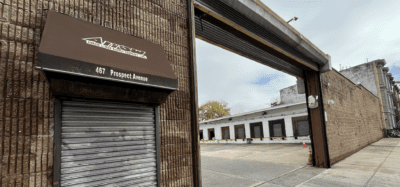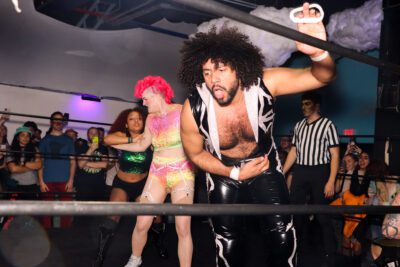How a Script Becomes a Pilot: Everything You Need to Know from Two New York Shorts Film Festival Participants
Often, having the urge to create something, and the confidence and know-how to pull it off, is a tough bridge to gap. Instead, most of our ideas remain stuck in our heads, because confronting the enormity of producing them, not to mention our own self doubt, is scary and hard.
But let’s jump ahead a couple of steps: Say you not only have a great idea—say for a TV pilot—say you’ve already written it. How on earth, if you’ve never done it before, do you gather the resources—crew, actors, finances, equipment, set locations, collective enthusiasm—to transform that into a real pilot? One that’s filmed, edited, and reduced to approximately 30 minutes, and that might be placed in front of Eyes That Matter, or submitted to a festival so that, god forbid, it earns a spot in one of them and (the ultimate dream) emerges as a funded series? Or even more simply than that, as something to carry around in your back pocket so that you can show people what you’re capable of? If you’re a fist-timer with a written script and limited funds, is this even possible?
The short answer is: yes. And this week, at the 6th New York Shorts International Film Festival, running through June 1 at Sunshine Cinema, 52 short films and pilots, many of them from young and first-time filmmakers, are there to prove it. Among them are Danielle DiPaolo, who wrote the pilot for Evolved, and Viridiana Lieberman, who co-directed and co-produced the festival-accepted short.
Evolved is a satire that documents the foibles of two aspiring feminist males in the world of love and dating, and it screens tonight at Sunshine Cinema. Earlier this month, DiPaolo and Lieberman sat down with me in the backyard of Broken Land in Greenpoint to lift the veil of mystery from the process of turning an idea into a pilot. Anyone, they told me, even if you live in the middle of nowhere and don’t have a gigantic pool of resources, or network of talented friends, can make a pilot and get into a festival—really. Personally, I knew nothing about the process, but after listening to each of them lay out the essential nuts and bolts of doing it (and communing with their noteworthy pools of optimism), I felt I could and wanted to do this, too. So read on, be inspired, learn a ton of pragmatic things, and know that, despite your deepest self doubts and general skepticism about the industry, you could show up at the 7th New York Shorts International Film Festival in 2018 with a fully-realized pilot of your own.
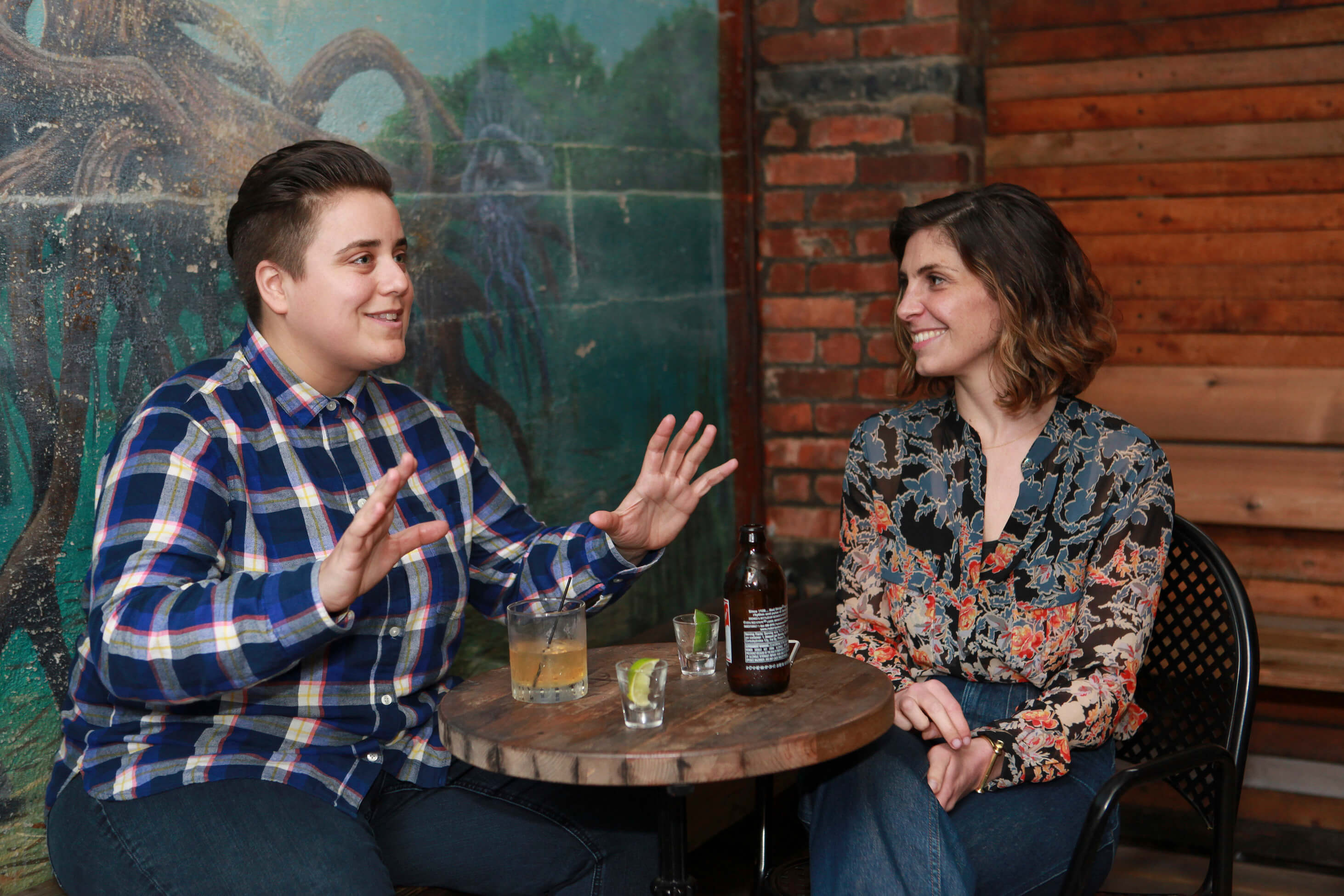
So let’s get into the details. How did this production happen?
Danielle DiPaolo: This all started because Viri suggested we might be able to shoot. I was a writer, I had been doing sketch stuff and writing sketch and seeing it come to life on a stage, but had no production experience at all. I went to film school and did a masters at Tisch, and my background is all history and theory and criticism. I don’t have any production skills. So I think I needed Viri to start. I never would never have considered shooting something on my own.
Viridiana Lieberman: I just need a script and someone who had a business mind, things I could execute.
DD: You’re a dreamer. You have huge ideas, but that’s how you should live your life. Dream big and let other people reel you in.
VL: I have a first draft heart, and a second draft mind. I always think that if I follow through with everything I’d dreamed about, I have no idea where I’d be. I’ll be like, that’s amazing, the best story, I’m gonna tell it! But next morning you tick off all the debris in your way.
DD: That’s you to me: I was like, I don’t know how to do this, and you’re like [miming pragmatic efficiency] “da, da, da.”
So you write something and then what happens next?
DD: When you write independent TV scripts, you write them and submit them to competitions and fellowships, or get an agent and manager if you’re lucky. Knowing that process is just from a vested interest and meeting people. They know what you don’t know.
And then you’ve gone to Austin Film Fest the last two years to learn more.
VL: They just have writers to help you with stuff, and panels.
DD: You submit, and if you get to a certain round you get more access and learn more.
VL: All the rooms are filled with blooming writers. But with books and Google, all the knowledge is out there for the taking now.
DD: We’re also obsessed with podcast called Scriptnotes. It’s a weekly reminder of things you should be keeping up with. Then there are some writers who are ahead of us in the game, and anecdotal evidence of how it can come together. It’s a dark science and you are taking stabs and readying yourself to whatever extent you can, so if people come your way, you can say, here’s my sketch packet, here’s the body of work I have.
“In this industry, the people who just do it will make it. Even if they are untalented, they will, because people don’t make things, they don’t follow through, they don’t complete their ideas, and if you just do it, you’ll be growing.”
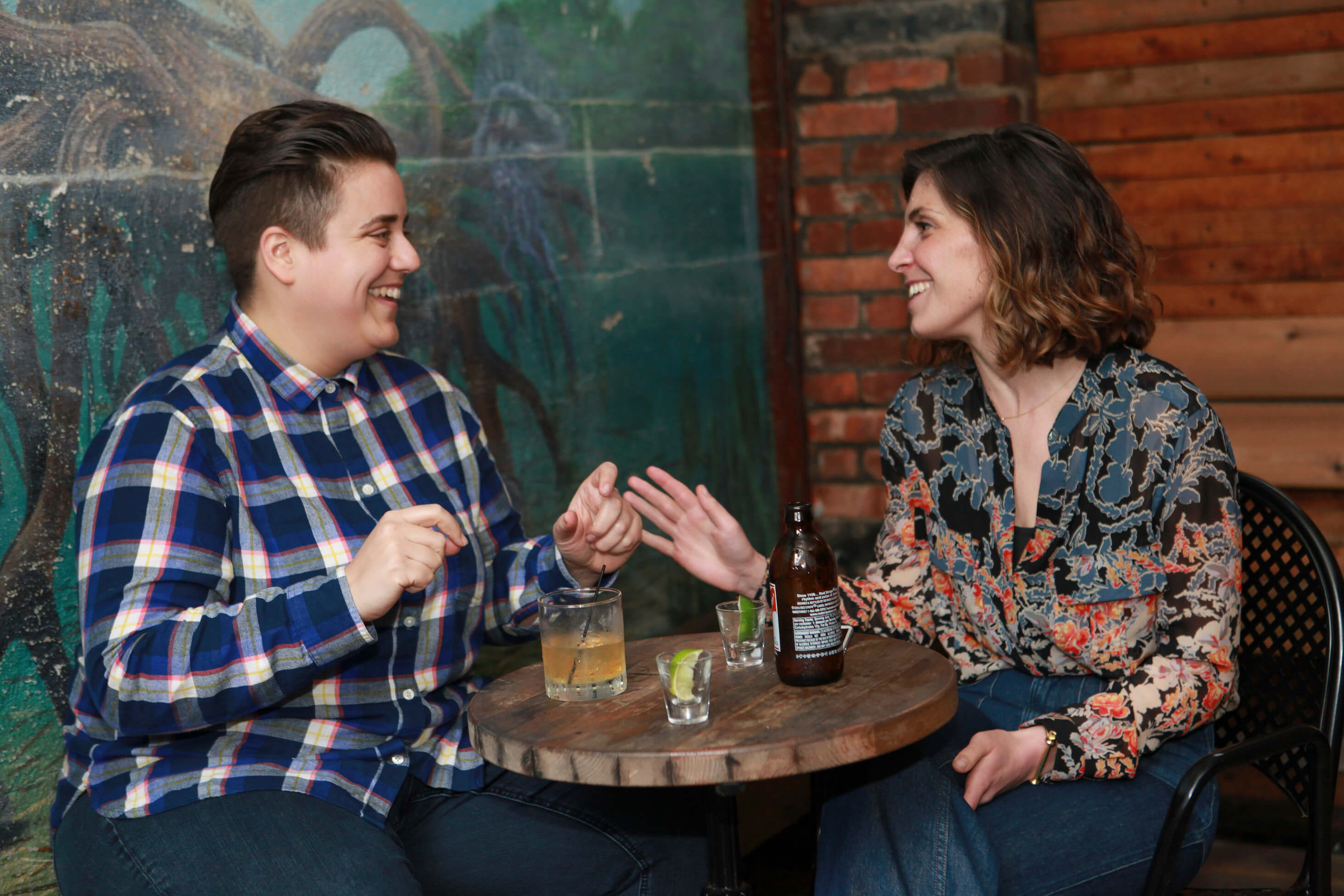

So in sum, you need a body of work, plus raw production skills to make something…
VL: I was the technical side. I’m a visual person. The way I write is visual versus structurally strong. I have to have characters, I can’t just have plot. We don’t all think that way. I’m an editor, that’s my main trade. I do shoot, but it’s not my strength [though], I do pride myself as a one woman band—sound, shoot, and edit. And logistics. I did do the shooting schedule.
What does that entail?
VL: I took the script and broke it down—what are the shots? I lined the script.
What does lining the script mean?
VL: Breaking it down by how many scenes there are, what are the locations, props, and cast. When you see a production draft, when you download it from online, it’s almost like an index page. It has the cast and episode and location. But when you’re writing it down and submitting it, it’s just a story.
“When you make a film, you plan as hard as you possibly can to stay on coarse, because inevitably everything is going to go to crap and you go off course. So it’s always going to be a race to the finish, but the crazier you organize, and the more binders you have, and the more paperwork you have, and the more understanding you have, it will pay off.”
That makes sense, because when you’re writing, you’re not even to a point where you think you’re going to be shooting it, it’s just a story.
VL: Right. You wanna write a script and you just wanna put it out there as a writing sample. But when I take a script, I start by pulling out information necessary to understand it in a technical sense. What are the challenges? Are there any special effects or sound effects? That’s the first thing, and then lining a script is when you—I still do this from film school—you are literally drawing a line from the start of the shot to the end, and you do that because you shoot from multiple angles, so you have coverage of a conversation, and shots on you and me, so you draw for how many shots are overlapping. It’s not complicated and hard if you’re visually imagining the scene.
DD: If you do that right and well, you’re going to keep it economized. You just stack everything. Nothing shoots in order, so you end up saving a shit ton of time moving everything and resetting this stuff.
VL: And that’s when it gets complicated but at the same time you’re simplifying: How many times can you move everybody to get the maximum amount of shots?


And then there’s the budget, the funds for which you raised through crowdfunding—is that done after the script is lined but before shooting?
DD: A lot of it can be retroactively done. If you only have a certain amount of money, you can figure out how to work within that budget. That’s not how we did it, but you can definitely do it that way. We built the budget based on the known hard costs like equipment rentals, paying the sound guy, props. And then we guess at and tried to save on the other stuff. So you go with the bar, for example, where you can shoot for free. You enlist your friends to cook your lunches.
VL: A strong understanding of pre-production is probably the hardest part of making anything. When you make a film, you plan as hard as you possibly can to stay on coarse, because inevitably everything is going to go to crap and you go off course. So it’s always going to be a race to the finish, but the crazier you organize, and the more binders you have, and the more paperwork you have, and the more understanding you have, it will pay off.
DD: You get enough binders it will pay off.
VL: Say a minimum of three. And at least ten scripts laying around, because everyone is going to lose them. So, yes, preproduction is an absolute make or break aspect of the whole thing. There will always be actors forgetting lines, people getting grumpy—you better feed that crew, there is more money spent on food and craft service than equipment most of the time. There are so many moving parts, all the way down to a PA or runner, and all the way up to the director. But then you also have the equipment—say you’re doing a run and gun shoot inside and hoping you don’t get kicked out—we’re talking about independent, not the blockbuster guys who have a million dollars and can buy a city block for the week. Even they have those problems.
That sounds very complicated.
VL: It sounds complicated, maybe it is, but I really think it isn’t. I just think that the steps are all there fore the taking. If you really look at what your needs are when you look at a script, the rest can really become logic and common sense. But yes, it’s just a lot to juggle.
“I’ve been on so many sets where the grump factor is contagious. And filmmaking is such a delicate house of cards that you have to quickly extinguish this, and you gotta do it fast.”
So, in short, planning is everything.
DD: And it’s also an attitude thing, being very able to roll with the punches, because it will all fall down. And then you also have to be down to change everything on a dime, because this [hypothetical thing] no longer makes sense given that [hypothetical change]. So you have to deal with what is thrown at you in the moment and be a planner.
VL: Problem solving and collaboration are my favorite things on the planet, but when we are on set and something goes a little awry, I’m like, ‘Pow-wow: how do we cut a couple of shots?’ and it’s so fun, and if you keep it fun, your vibe will be great, because it can quickly deteriorate on a set. It can be contagious. I’ve been on so many sets where the grump factor is contagious. And filmmaking is such a delicate house of cards that you have to quickly extinguish this, and you gotta do it fast.
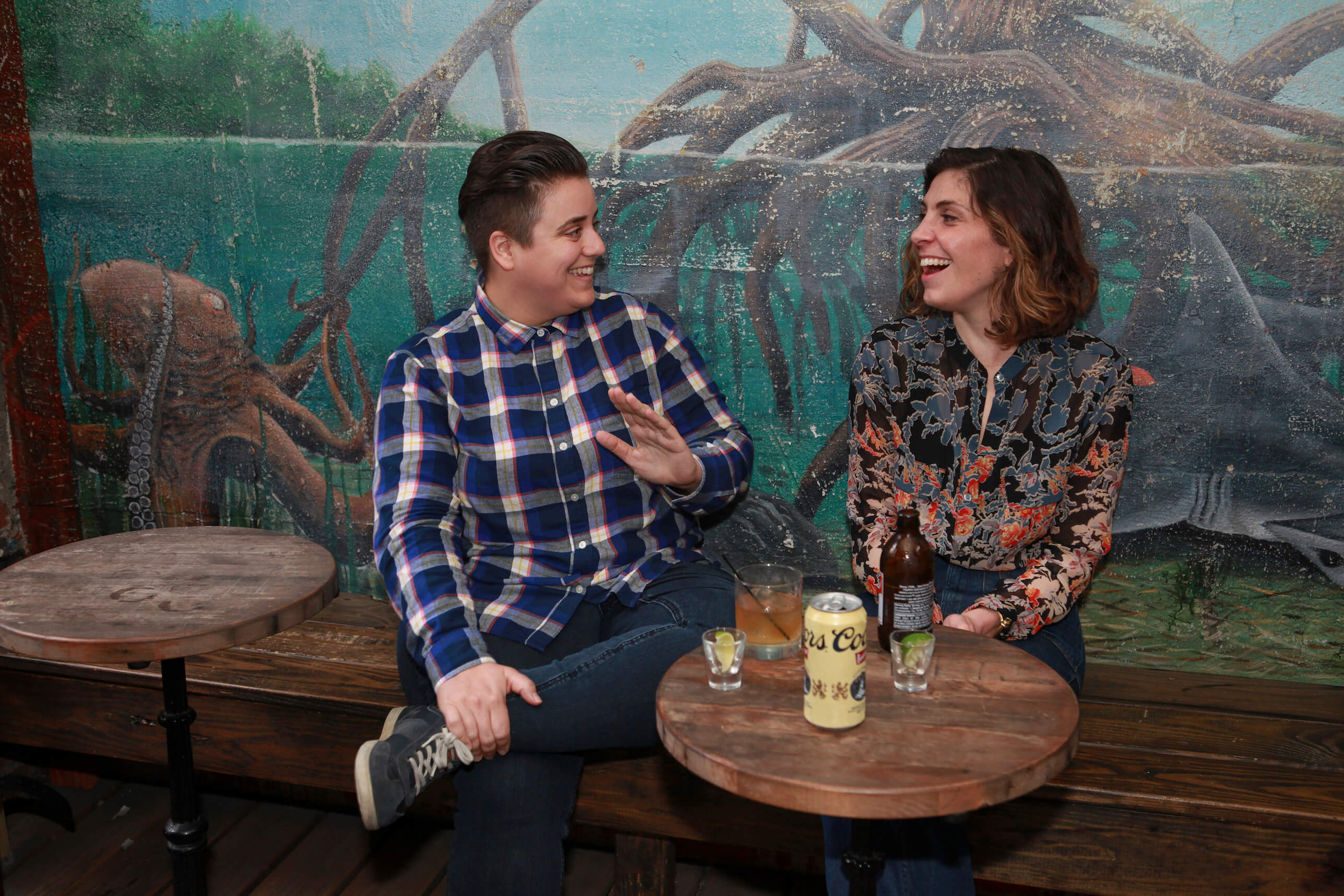

It sounds like your vibe was maybe an exceptionally good one on set.
VL: Evolved was a dream. Danielle hadn’t done that before and I was like, this is ridiculous, we are in a dream sequence—how we pulled off a filming schedule that I created, that was absolutely impossible, I had to keep reminding her that the shoots she does in the future might be different, but it might not be, because maybe that’s the way you and I work.
How did you cast Evolved?
DD: It was such a joy to cast this pilot because no one was allowed on set who was not a feminist. That was a straight up a rule. If we don’t believe you’re a feminist, you’re not allowed to touch his project. It was a lot of dudes and if anyone has ever given me a weird feeling, or I’m not sure, then no. I’m lucky we know a lot of good people, and dudes who had no problem filling that out, and we knew a lot of talented people. We did’t have to sacrifice skill level; we were able to have it all: smart and funny and positive people, who every day came and were consummate professionals and knew their shit, and were down to roll up their sleeves and do a little extra if they have to.
VL: On the top-tier, a lot of assholes make it through, and people eat it because they’re so amazing. Every day I hear a story about what a terrible human they are, and doing that editing makes me so sad. But then we’re on a set like Evolved, and I’m like, aw, all these people are great, and they also happen to be incredibly talented, it gives me a lot of hope.
Ok so let’s recap: You first produce the magic script, then you plan the shit out of shooting it, then you make a budget, then you shoot everything, and then… what?
VL: We wrap all the footage, and usually you kind of pass it to the editor and screen all of it. I’m also a firm believer in script supervisors on set, and also lining a script. Every time we take each shot, we’re taking notes on which take we liked, and if something didn’t finish, or an actor messed up a line. So the script supervisor becomes our right hand.
DD: Right, like if there’s one best take, just write it down, that’s the thing we’re gonna use.
VL: It’s a shorthand of the entire shoot. It’s a paper edit of what actually happened. Tat goes to the editor and she will create a rough cut or an assembly using all the shots in the order that makes a show. And then you start sending notes and you review and revise, and revise, and cut, and then you really go to the final stages, which are sound magicians who make it sound wonderful and put in music and balancing, and then you send it to a colorist who will make it sing.
Basically why we have Instagram.
VL: Same thing. It’s filters.
DD: Honestly, all of Evolved was shot through Hefe.
VL: And then you’re done, but we’ve submitted to places and to festivals.
“Base level, this will do what we want it to do, which is to show what we can do. If our goal was purely, “We have to get to network TV,” that’s a small funnel and a high bar. So instead, if our goal is: Let’s make something, so we can show people we can make something? We’ve already done it.”
But you’re also not done because what happens to it then?
VL: Right, so then it becomes: What is the goal with this? [Danielle and I] come from two different camps on this. For Danielle, a big part of this was to get staffed and to get her writing career launched, and for that there is nothing more powerful than getting something produced. You get a ton of scripts and don’t have time to read them, but watching something? And then for me, the pilot is a pitch we can use to try to get backers to distribute it in a mainstream way.
DD: They call that proof of concept. So here’s what we created, here’s how it looks and what it sounds like, and the vibe and tone of it—we’re doing all your work for you if you are an agent or manager or development executive. We’ve done so much leg work for you, to help you envision how this could play. And that’s true even if it’s not good. But if it happens to be good on top of that, you’re off to the races.
VL: And you have a shot of having the people who were involved in the pilot moving forward with it, or you could sell it and cast it with big names and faces and that’s that. So we initially did it for our reels, and then to show people what you can do, and then to put it into festivals, and then to just put it online and let people see it!
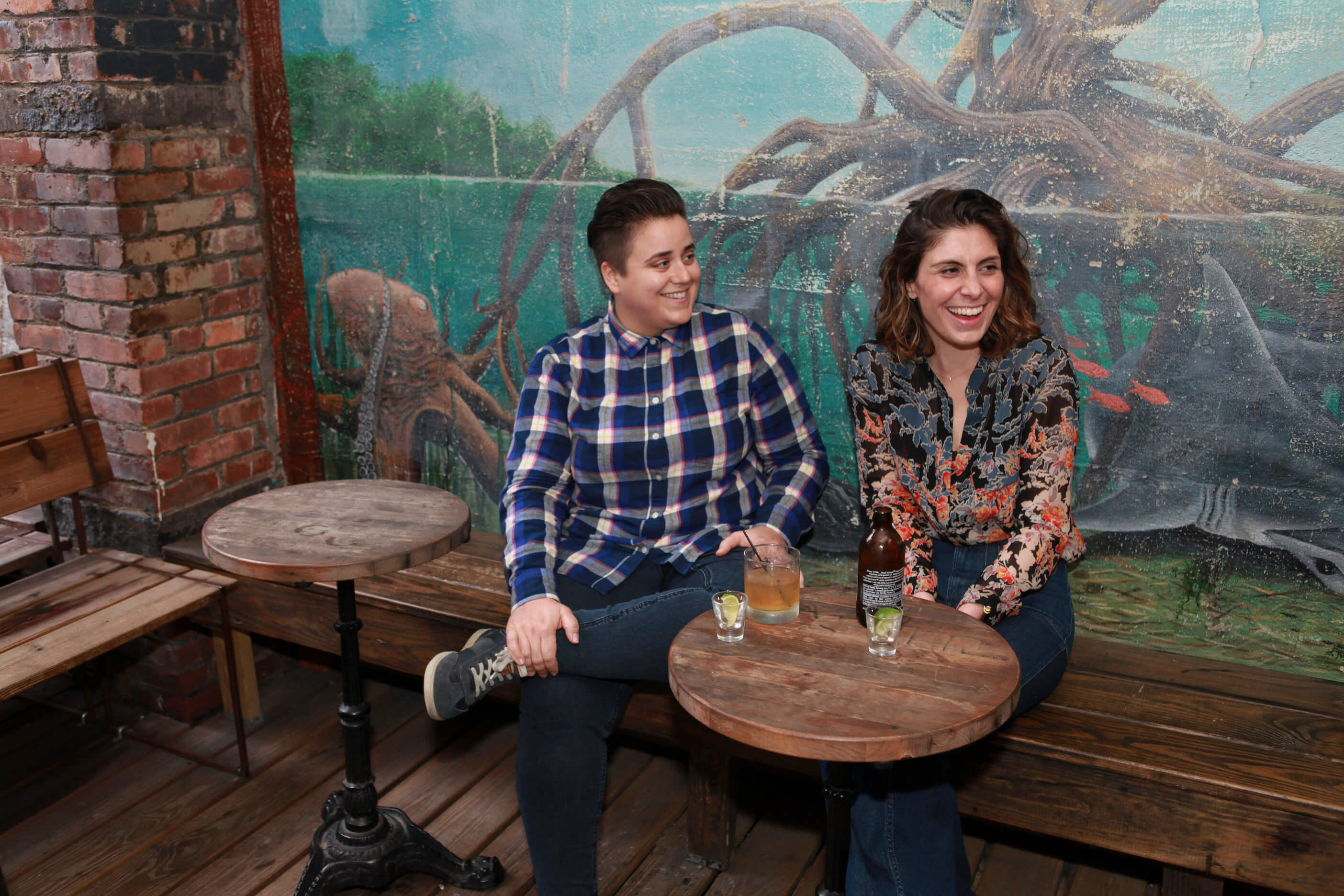

Are festivals mostly still a path to distribution?
VL: I am still a believer in that, but what I would say, I don’t know TV—this is where we’re in different camps.
DD: [Viri, you] come from films and producing films, and there are lot of film festivals that have genuine markets to them, but TV doesn’t work that way. You need networks and a distribution platform, so if you’re going to a festival with a TV pilot, you still need a shit ton of infrastructure to come into place. So I’ve alway thought of it as a sample, and if we got a platform, we would move forward. But that is so much the exception that it can’t be the game plan—but that is an outlier and it’s fine to shoot for an outlier.
VL: Maybe that’s the difference. You think of it as a sample and I think of it as a pitch.
DD: Both, yes.
“No one will be able to take away the fact that we did this and it looks good, and in a world and industry where so much is out of your control, you have to hold on to the things that you can control and are yours, and you own.”
So the main point of getting a pilot into a festival comes down to your own personal goals: If you want to be a TV writer, and you want to be a director, if a festival appearance helps you do either one of those things, it’s done its job.
DD and VL: Yep, that’s it.
VL: That is true, and the other reason I love festivals is purely networking. I love Q&As and interacting with people about your work, and to show something.
DD: She is a very good talker.
VL: This is the thing I love talking about the most.
I am not surprised.
VL: It’s true, and [Danielle] has always pulled me back to earth in a good way. Base level, this will do what we want it to do, which is to show what we can do. If our goal was purely, “We have to get to network TV,” that’s a small funnel and a high bar. So instead, if our goal is: Let’s make something, so we can show people we can make something? We’ve already done it.
“Let other people say no to you. You greenlight your own shit. Greenlight all your own shit. Every damn thing you’re working on, and doing, because you can’t sit around.”
Shit. I’ve learned so much.
DD: I’m like a hedger. If nothing else, this pilot is what we take away, and no one else can take that from us. And that’s an enormously empowering thing, even if this gets nowhere. I felt like, even if it gets into zero festivals and goes nowhere, we still have it! That’s not the pie in the sky version, but no one will be able to take away the fact that we did this and it looks good, and in a world and industry where so much is out of your control, you have to hold on to the things that you can control and are yours, and you own. And whatever rocky shit is coming your way, that pilot is your own. And you’re just making shit that you’re proud of. At the end of the day, if this goes nowhere and no one sees it, I’m super proud of it, and I’m fucking happy that this was an opportunity for us to work together.
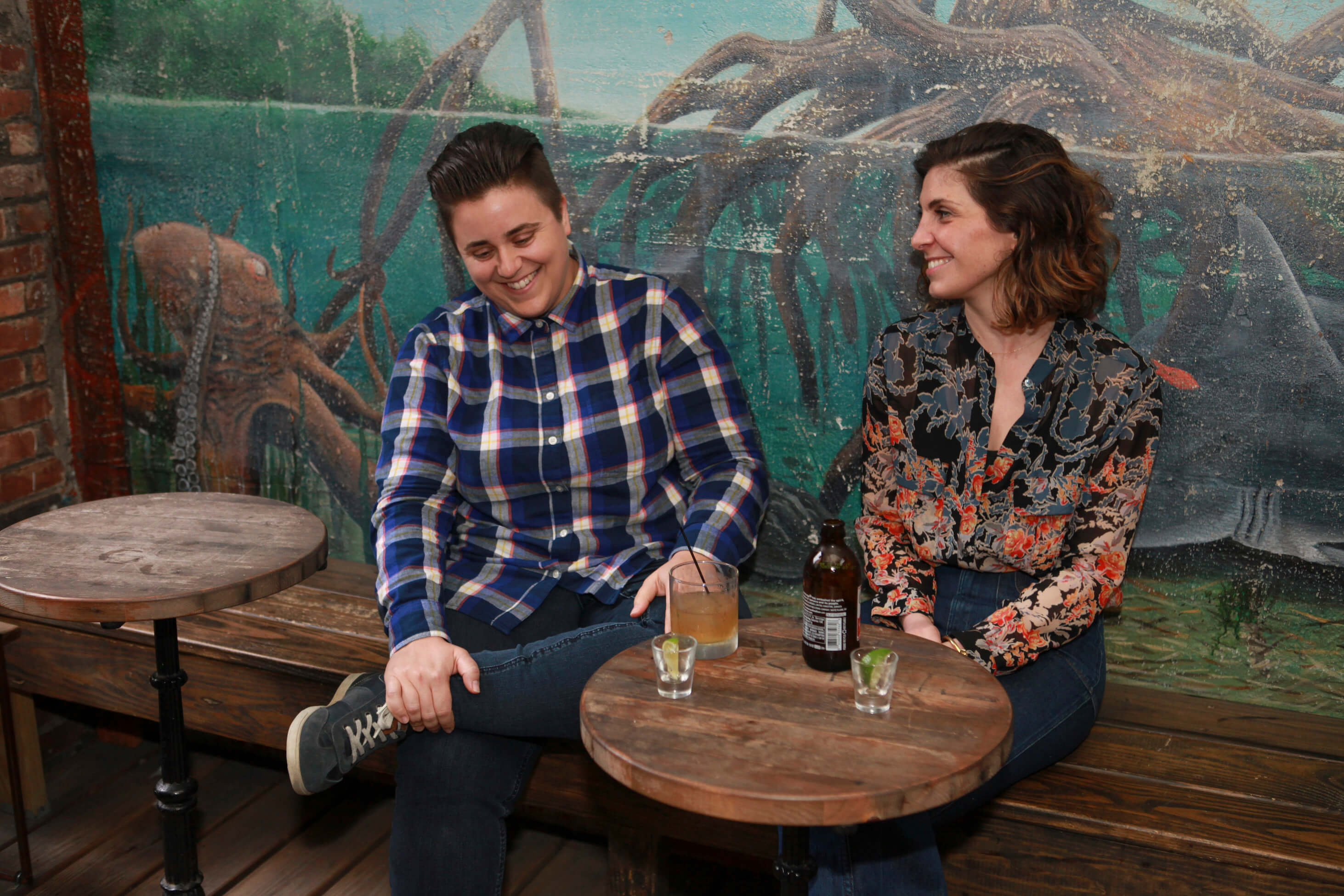

How many people can say that they’ve made something like this?
VL: That’s what I was going to say. Our friend Jess was like, stop moving the goal post, which was a great thing to say to me. I’ll reach for something and I’m like, what’s next, what’s next? And you can’t say that. You have to say: Whoa, we just did that. And in this industry, the people who just do it will make it. Even if they are untalented they will, because people don’t make things, they don’t follow through, they don’t complete their ideas, and if you just do it, you’ll be growing.
Right. You’ll be the one who has something to show when someone is ready to see it. You’ll be ready.
DD: Let other people say no to you. You greenlight your own shit. Greenlight all your own shit. Every damn thing you’re working on, and doing, because you can’t sit around.
Aaaah! I need to make so many things!
DD: You are and you do! But there are so many ways the world will slow you down, and give you obstacles.
VL: I hate to say this but the world is a “no” place. That sounds so terrible and tragic but the difference in people are the people who hear the “no” and the people who hear the “no” as a call to action. And you start pitching your friend an idea and they’re like, how the heck are you going to do that? And you’re like, “I’m gonna do it! Like at the end of the day, you just do it. You have the control to follow through on anything.
But even, say, for someone who lives in Lincoln, Nebraska, and not in New York City? Someone who doesn’t have the same access to resources and the networks you have here—can they do it, too?
VL: You can still do it.
DD: You can, but it won’t be as easy as it will be for people who are here. I am beyond grateful. I don’t have enough words of gratitude for the network we had at our disposal.
VL: But to the Lincoln pitch: I am a positive person. Nowadays, with an iPhone or a zoom recorder for 150 bucks, or ProAudio and a Youtube education—you can go there and learn anything. You can get a laptop with video editing software built into it! At the end of the day, the quality level might not be as high, but it’s irrelevant because if you’re telling a good story—I watch so many films at so many festivals where i’ll say, it’s shot crazily, but the characters are so fun and cool, or it was so smart. That is what is relevant. On that same note I’ve seen crappy stories that were beautifully shot.
DD: I probably shouldn’t say this but I do think for comedies you can get away with crappier production. But make it a choice. You think about the renaissance of that documentary style in The Office and Parks and Recreation, and those were network. They didn’t look spectacular and that was part of the aesthetic, and it created a greater appetite in comedy for things that look a little more raw and were scrappier.
That opened the door to many more people.
DD: And there are more places where you can go and live, and more platforms that don’t need to adhere to the same codes and standards that are now antiquated.
VL: When I was growing up, the option was to go to the local duplex and see something on a big screen, and no one knew how they got it there—it felt like royalty, it felt so inaccessible, and no one knew how they got it there.
“If you’re the kind of person who can ride out the many years, and false starts, and pivots and turns of closing that gap—and it will take you years—if you can endure it, and figure it out, and stick around long enough, with every step you take you will eventually close the gap, and get to a place that aligns with your taste.”
Well all of this was new to me, I learned so much.
VL: Today, if you are good, you will make it.
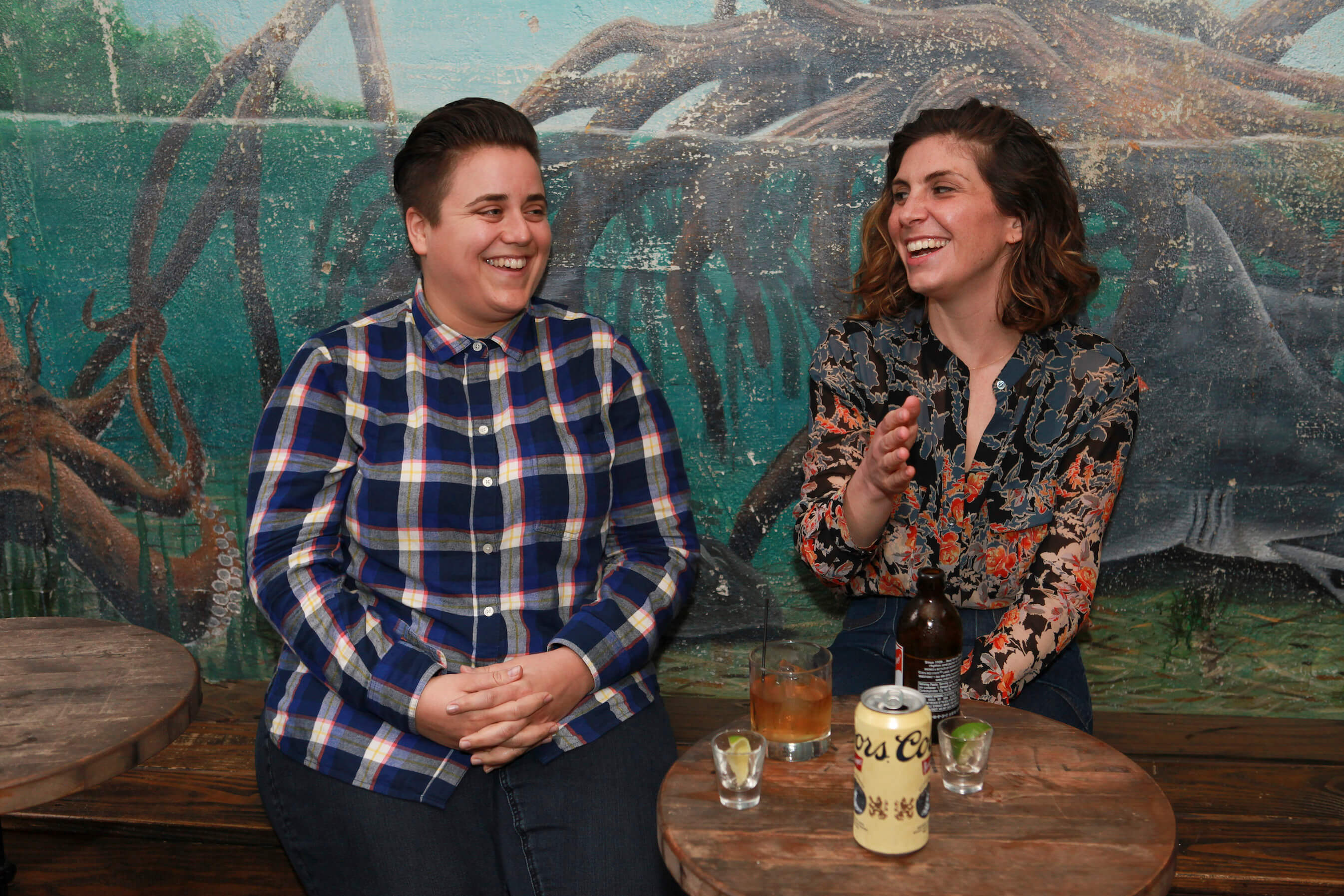
That is both depressing and awesome.
VL: No, because a part of that is confidence. When I heard that, it was a relief to me. If I love what I’m doing, it’s not about ego. I made what I wanted to make and I’m pumped about it, and you’ll get there. It’s not all who you know and money. It’s not. You’ll make it.
DD: And I am intractable and stubborn and indefatigable.
VL: And by the way, good is relative. No one can ever define what good means.
DD: If you can put the work in, and stick out five years of not being as good as you wanna be, there is always going to be a gap between taste and your ability; and if you’re the kind of person who can ride out the many years, and false starts, and pivots and turns of closing that gap—and it will take you years—if you can endure it, and figure it out, and stick around long enough, with every step you take you will eventually close the gap, and get to a place that aligns with your taste.
VL: And I was saying, you do have to fall in love with a socially constructed idea of failure, because you’re going to do it. Not everyone likes your work, but not everyone likes anything. So if you can remind yourself of that, you just have to focus on what you love. If you make what you like, you’re set.
All Images by Kait Ebinger
You might also like 














